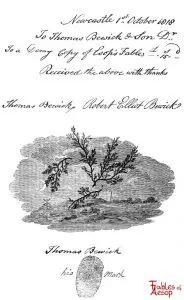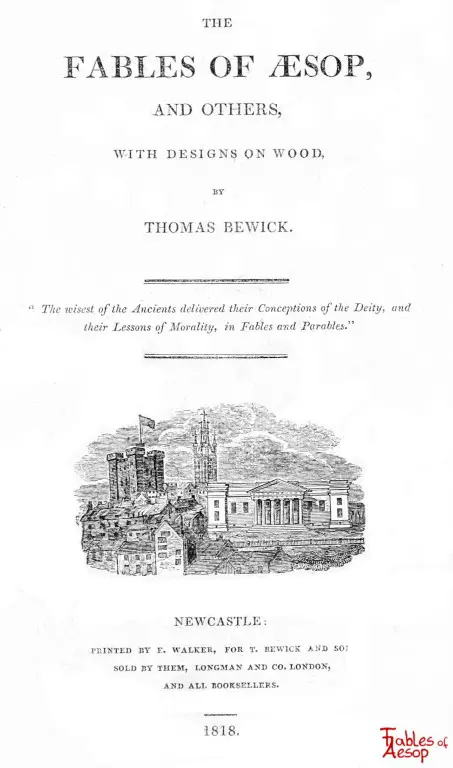THE PREFACE DEDICATORY.
To the Youth of the British Isles.

In collecting together, for your use and benefit, some of the prudential maxims, and moral apothegms, of the ancient sages, the Publishers ©f this volume have been stimulated by an ardent desire to render this excellent mode of instruction as agreeable as possible; and, at the same time, to impress the precepts contained in the Fables more forcibly on your minds, they have endeavoured to make the embellishments worthy of your notice and examination.
If the seeds of morality and patriotism be early sown, they will spring up, and ripen to maturity, in a confirmed love of truth, integrity and honour; and without these for his guide, no man can do credit to himself or his country. This consideration is of vital importance; for our comfort and happiness through life, mainly depend upon a strict adherence to the rules of morality and religion. The youth who is early tutored in an invincible regard for his own character, will soon perceive the duties imposed upon him by society, and will have pleasure in fulfilling them, as much for his own satisfaction as for the sake of his fellow men: but when the latent powers of the mind are neglected, or not directed into the paths of rectitude, by good precepts and worthy examples, vice and folly enter the opening, and lead their victim into evils and errors, which render his life miserable, and sometimes hurry him into an ignominious grave.
To delineate the characters and passions of men, under the semblance of Lions, Tigers, Wolves, and Foxes, is not so extravagant a fiction as it may at first sight seem: for the innocent and inexperienced will find, when they engage in the busy scenes of the world, that they will have to deal with men of dispositions not unlike those animals; and that their utmost vigilance will be required to guard against their violence or machinations.
In attempting to form an estimate of the characters of mankind, many gradations and shades will be found between the two extremes of virtue and vice. The philanthropist views with feelings of benevolence the wavering balance, and adds those he finds on the confines, to the number of the virtuous; while the misanthrope, with gloomy malignity, endeavours to include within the circle of vice, those who are standing upon the ill-defined line of division, and thus swells the number of the bad. Both observe with pain, that great numbers exist, whose whole lives seem to be spent in disfiguring the beautiful order which might otherwise reign in society, regardless of the misery which their wickedness scatters around them. They see men, who suffer their bad passions and gross appetites to be the sole rule of their conduct; and whether these shew themselves in an inordinate ambition, a thirst after false glory, or an insatiable avarice, their consequences are pernicious, and diffuse evil and distress over this beautiful world, in proportion to the extent to which their baneful influence reaches. The misanthrope, in contemplating the scene of mischief and disorder, is apt to arraign the wisdom and justice of Providence for permitting it to exist; but the philanthropist views it with a more extended range of vision; and while he laments the evil, he attributes the apparent want of human feelings in the actors, to an early perversion of intellect, or to a stifling of the reasoning power given by the Great Creator to man for his guide, and without which he is the worst animal in the creation, a mere two-legged Tiger. Upon the childhood and youth of such men, the great truth taught by the inspired and wisest writers of all ages, that “no life can be pleasing to God which is not useful to man,” has not been sufficiently impressed, or probably the energy with which they pursue their wicked career might have been led into a different course, and instead of the scourges, they would have been the benefactors of mankind.
When religion and morality are blended together in the mind, they impart their blessings to all who seek the aid of the one and obey the dictates of the other, and their joint effects are seen and felt in the perpetual cheerfulness they impart. They incite the innocent whistle of the ploughman at his plough, of the cobler in his stall, and the song of the milk-maid at her pail: and it is a sign of their being perverted, when they engender melancholy notions; for these are the offspring of bigotry, fanaticism, and ignorance. The service of the Omnipotent is not of this gloomy cast; he has spread out the table of this beautiful world of wonders, for the use of his creatures, and has placed man at the head of it, that he might enjoy its bounties, as well as prepare himself for the approaching change to another, which inspiration has powerfully impressed on his soul as the unknowable region of his next advance. The materialist, in his dreary reveries, cannot comprehend this, neither will he acknowledge that his being placed here is equally as miraculous as that he should be placed in another world or worlds, progressively to improve, to all eternity: but to harbour doubts on this subject, is like disputing the wisdom, the justice, and the mercy of the Author of our being, who, according to the conceptions we form of his goodness, as exhibited in the design, the grandeur, and the immensity of creation, where every thing is systematic, regular, and in order, would never decree that man should be placed here instinctively to know his Maker–to take a short peep at the stupendous, the amazing whole–to view all these, and have powers of mind given him only to know and repugnantly to feel, that after a life mixed with turmoil, grief, and disease, he is to be annihilated! In our conception of things, and to the limited understanding which has been given us, all this would appear to be labour in vain.
The volume of the creation speaks alike to all, and cannot be defaced by man; but the ways of Providence are beyond his comprehension. Omnipotence has not been pleased to gratify his pride and vanity, nor to consult his understanding, in the government of the universe; but sufficient has been disclosed unto him to point out the moral duties he owes to society, and the religious worship due to his Maker, without groping after what is utterly beyond his reach: for our feeble reason is too weak to comprehend the divine essence; and our thoughts, on their utmost stretch, roll back on darkness. We reason, but we err: for how can we comprehend the immensity of endless space, of time and eternity, a beginning or an end; or what conceptions can we form of the Power which made the sun and worlds without number? Truly, tins is far too much for a finite being, who does not know why he can move one of his own fingers, or cease to do so when he pleases! But all may know and fulfil their religious obligations, by reverencing and adoring their Creator, and walking humbly before him, and their moral duties, by being in their several stations, good sons, brothers, husbands, wives, fathers, mothers, neighbours, and members of society.
Having, with humble diffidence, in this masquerade of life, attempted to point out to youth the exterior of the temple of virtue, and to lead them to its steps, the Editor leaves them there, respectfully recommending them to explore the whole interior, under the guidance of men more eminent for their mental powers and attainments in learning, philosophy, and piety. Of these, an illustrious band have placed, at every avenue and turning, their inestimable works, as directions to guide us to usefulness and respectability here, and eternal happiness hereafter.

Newcastle, September, 1818.
